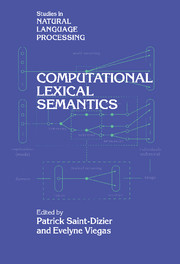Book contents
- Frontmatter
- Contents
- List of contributors
- Preface
- 1 An introduction to lexical semantics from a linguistic and a psycholinguistic perspective
- Part I Psycholinguistics for lexical semantics
- Part II Foundational issues in lexical semantics
- Part III Lexical databases
- Part IV Lexical semantics and artificial intelligence
- Part V Applications
- Part VI Computer models for lexical semantics
- Author index
- Subject index
Part I - Psycholinguistics for lexical semantics
Published online by Cambridge University Press: 29 September 2009
- Frontmatter
- Contents
- List of contributors
- Preface
- 1 An introduction to lexical semantics from a linguistic and a psycholinguistic perspective
- Part I Psycholinguistics for lexical semantics
- Part II Foundational issues in lexical semantics
- Part III Lexical databases
- Part IV Lexical semantics and artificial intelligence
- Part V Applications
- Part VI Computer models for lexical semantics
- Author index
- Subject index
Summary
The first topic, psycholinguistic and cognitive aspects of lexical semantics, is addressed in the first two chapters. This area is particularly active but relatively ignored in computational circles. The reasons might be a lack of precise methods and formalisms. This area is, however, crucial for the construction of well-designed semantic lexicons by the empirical psychologically based analysis introduced in the domain of computational lexical semantics.
“Polysemy and related phenomena from a cognitive linguistic viewpoint” by Alan Cruse surveys the ways in which the contribution of the same grammatical word makes to the meaning of a larger unit depending on the context. Two main explanatory hypotheses that account for contextual variation are explored: lexical semantics and pragmatics. Alternatives to this approach are studied in the other parts of the volume.
The second chapter, “Mental lexicon and machine lexicon: Which properties are shared by machine and mental word representations? Which are not?” by J.-F. Le Ny, sets language comprehension and interpretation within a general cognitive science perspective. Properties common to natural and artificial semantic units (e.g., denotation, super-ordination, case roles, etc.) are first explored. Then, problems related to activability and accessibility in the memory are addressed in both a theoretical and experimental way.
- Type
- Chapter
- Information
- Computational Lexical Semantics , pp. 31 - 32Publisher: Cambridge University PressPrint publication year: 1995

